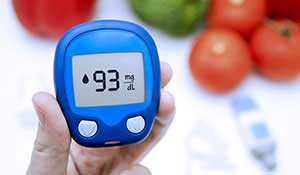
Diabetes can affect your health, lifestyle, emotions, relationships and finances. But you are not alone. At Rapides Regional Medical Center, our primary care doctors can help you take control of your risk factors or manage your diabetes. With the right care team, you can lead a full and active life.
At Rapides Regional Medical Center we offer diabetes prevention and care for:
- Prediabetes
- Type 1
- Type 2
- Gestational
One in two adults with diabetes are undiagnosed (over 212 million people) according to the International Diabetes Federation.
Diabetes Symptoms
Many times, if type 2 diabetes is caught early in the disease state (through routine labs), people do not experience any symptoms.
Symptoms can include:
- Blurred vision
- Frequent urination
- Excessive thirst
- Increased hunger
- Fatigue
- Irritability
- Slow healing sores
- Unexplained weight loss (rare)
What is Diabetes?
Diabetes is a disease that occurs when your blood sugar is too high (hyperglycemia).
The pancreas is a large gland situated behind your stomach. The pancreases contains beta cells that make a hormone called insulin. Insulin is responsible for moving sugar from your blood to your cells where it is used for energy.
Beta cells release a specific amount of insulin at particular times in order to control your blood sugar, otherwise known as blood glucose.
Another hormone, glucagon, is responsible for telling the liver when to release stored sugar. This is needed when your blood glucose gets too low.
A third hormone, GLP-1, helps the pancreas release the right amount of insulin when you eat. GLP-1 is responsible for helping:
- The pancreas release insulin when blood sugar is too high
- Lower the amount of sugar made by the liver
If you have diabetes, your beta cells may not be functioning properly. Over time, the beta cells decrease and the pancreas makes less and less insulin. In type 1 diabetes patients this process happens suddenly as opposed to over a period of time.
If you have type 2 diabetes, there also may be other issues including:
- The body may not be using insulin efficiently
- Your body may require much more insulin than normal
- Not enough insulin may be made due to GLP-1 not working normally
- Your liver may release too much sugar
Diabetes Tests
If you have been diagnosed with type 2 diabetes, you should see your primary care doctor several times a year. Your physician should review your medical history and conduct a thorough physical exam two to three times per year. These check-ups will include nutrition, physical activity, management of diabetes and cardiovascular risk factors (such as weight) and related complications. They will also take your blood pressure and check your feet. The following exams should also be completed annually:
- A thorough foot examination
- Dilated eye test
- Fasting lipid bloodwork
- Kidney test (Urine albumin-to-creatinine ratio)
You should have an A1C test (which tests your average blood sugar level) every three months if you are not at goal, and every six months if you are stable and meeting goal.
For every one percentage point drop in A1C there is a 40% reduction in the risk of complications
Diabetes & Heart Disease
Heart disease is currently the leading cause of death in the United States. But if you are diabetic, your risk for heart disease is about four time higher than someone without heart disease. And unfortunately, 42% of diabetics also have heart disease and often don’t know they have it.
If you have diabetes, especially if you had it for a while, you should be screened for heart disease. Fortunately, it is possible to give people back years of their life because of new innovative treatments. Some diabetes medications are able to lower glucose and reduce your chance of a heart attack, stroke or death.